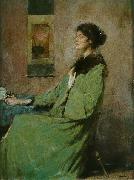China al por mayor de Marco de Oleo |
|||||||||||

|
|||||||||||
|
|
|
||||||||||||||
|
Thomas Dewing
(May 4, 1851 C November 5, 1938) was an American painter working at the turn of the 20th century. He was born in Newton Lower Falls, Massachusetts. He studied at the Acad??mie Julian in Paris, and later settled into a studio in New York City. He married Maria Oakey Dewing, an accomplished painter with extensive formal art training and familial links with the art world. He is best known for his tonalist paintings, a sub-genre of American art that was rooted in English Aestheticism. Dewing's preferred vehicle of artistic expression is the female figure. Often seated playing instruments, writing letters, or engaged in other impassive actions and situated in gauzy, dreamy interiors, the figures remain remote and distant to the viewer. These scenes are infused with a color that pervades the entire picture, setting tone and mood. The ethereal delicacy and subtle color harmonies of Dewing's paintings have not met with universal approval: some feminist critics have lambasted Dewing's work as being misogynistic; he rarely painted anything other than the female figure, vacant of expression, languishing in sumptuous clothing. Tonalism quickly came to be considered outdated with the advent of modernism and abstraction in art, though Dewing was successful in his own day. His art was considered extremely elegant, and has undergone a subtle revival in the last 10 years or so. Dewing was a member of the Ten American Painters, a group of American Impressionists who seceded from the Society of American Artists in 1897. |
||||||||||||||
|
|
||||||||||||||
|
||||||||||||||
|
|
||||||||||||||
| Thomas Dewing
(May 4, 1851 C November 5, 1938) was an American painter working at the turn of the 20th century. He was born in Newton Lower Falls, Massachusetts. He studied at the Acad??mie Julian in Paris, and later settled into a studio in New York City. He married Maria Oakey Dewing, an accomplished painter with extensive formal art training and familial links with the art world. He is best known for his tonalist paintings, a sub-genre of American art that was rooted in English Aestheticism. Dewing's preferred vehicle of artistic expression is the female figure. Often seated playing instruments, writing letters, or engaged in other impassive actions and situated in gauzy, dreamy interiors, the figures remain remote and distant to the viewer. These scenes are infused with a color that pervades the entire picture, setting tone and mood. The ethereal delicacy and subtle color harmonies of Dewing's paintings have not met with universal approval: some feminist critics have lambasted Dewing's work as being misogynistic; he rarely painted anything other than the female figure, vacant of expression, languishing in sumptuous clothing. Tonalism quickly came to be considered outdated with the advent of modernism and abstraction in art, though Dewing was successful in his own day. His art was considered extremely elegant, and has undergone a subtle revival in the last 10 years or so. Dewing was a member of the Ten American Painters, a group of American Impressionists who seceded from the Society of American Artists in 1897. 1912(1912) Medium Oil on canvas Dimensions Français : 54 x 41.3 cm cyf |
||||||||||||||
|
Related Paintings to Thomas Dewing :. |
||||||||||||||
|
|
||||||||||||||
|
|
||||||||||||||
|
CONTACTE EEUU |







